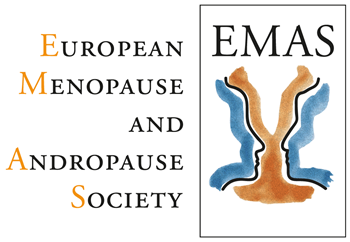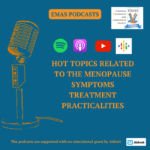Host: Welcome to today’s podcast. Menopause beyond hot flashes: Effects of estrogen deficiency on sexual life, skin, and hair. This episode is part of a podcast series supported by Abbott. The content is solely the responsibility of EMAS, The European Menopause and Andropause Society. All our episodes are available in English, Spanish, Mandarin, and Russian, and you can find them on any of the most popular podcast platforms.
In today’s episode, Dr. Panagiotis Anagnostis, an endocrinologist at the Aristotle University of Thessaloniki, Greece, will help us understand the effect of menopause on the skin and sexual life, as well as the effect of menopausal hormonal therapy, in this regard.
Dr. Panagiotis Anagnostis: Dear colleagues, this is Panagiotis Anagnostis. I’m an endocrinologist from Greece at the unit of reproductive endocrinology from the 1st Department of Obstetrics and Gynecology of the Aristotle University of Thessaloniki. During the next 7 minutes, I will discuss the topic of menopause beyond hot flashes. Effects of estrogen deficiency on sexual life, skin, and hair.
Most menopausal symptomatology affects more than 20% of menopausal women with the most common symptoms, which significantly affect their quality of life, including vasomotor symptoms – such as hot flashes, night sweats, and sleep disturbances – which may start during the perimenopause and with a mild duration of 7.4 years. There are also some other physical symptoms which include the so-called genitourinary syndrome, which we will discuss later, palpitations, headaches, bone, joint, and muscle pain, tiredness, insomnia, psychological symptoms, and cognitive dysfunction, including memory loss, irritability, and or concentration, as well as loss of confidence. Except for these classical vasomotor and other menopausal symptoms, skin and hair symptoms also affect the postmenopausal women’s quality of life.
These symptoms receive less attention than other menopausal symptoms. Dry skin is the main symptom, affecting above 72%. As well as wrinkles and sagging, especially on the face, which contributes to an increased perception of aging and decreased attractiveness with a significant impact on quality of life. Skin dryness may be noticed in early pre-menopause, but it may initially be somewhat compensated by sebaceous gland hypertrophy. Skin rigidity has been positively correlated with time since menopause. Skin atrophy is due to collagen loss and it is more pronounced in menopausal women. More specifically, in early menopause, skin collagen levels decrease fairly rapidly, with a collagen reduction of approximately 30% in the first 5 years.
Some other skin problems include diffuse effluvium due to follicular rarefication, as well as androgenetic alopecia or female balding, which may be observed later in menopause. Except for this reduced scalp hair pattern, increased hair growth in certain areas of the face may also develop. The main pathophysiology of these skin disorders includes the presence of estrogen receptors, which are abundant in both the dermis and epidermis, and are most dense in the genitalia, face, and lower limbs. Estrogen deficiency alters certain skin functions, as well as impaired skin barrier function, causing skin dryness from diminished skin moisture, and decrease sebum production.
Decreased collagen and elasticity are also related to estrogen deficiency, as well as a decrease in the Glycosaminoglycans in the extracellular matrix, as well as affecting thermal regulation. Moreover, estrogen prolongs the Anagen Phase of the hair cycle which enhances hair growth by increasing the synthesis of essential growth factors, which stimulate the proliferation of follicular keratinocytes. Besides skin dryness, vaginal dryness, vaginal irritation, and itching may also occur, which may be followed by reduced elasticity, dyspareunia, urinary urgency, dysuria, and recurrent urinary tract infections, which will deteriorate with time from the menopausal transition, but in some cases, may significantly affect the quality of life.
The last symptom of the so-called, Genitourinary syndrome of menopause. In terms of therapy, menopausal hormone therapy which is not indicated for the sole purpose of skin disorders may have a beneficial effect in this regard. Estrogen improves skin surface, texture, hydration, the collagen content of the dermis, and viscoelasticity. However, the results on wrinkles are less clear. Although in some studies, an improvement has been observed after menopausal hormone therapy. Topical estrogens [INAUDIBLE] and phytoestrogens may also improve the estrogen-deficient skin.
With regard to sexual life, the loss of estrogen and androgen levels after menopause is associated with low sexual desire in about half of these cases. Which along with the genitourinary syndrome of the menopause, significantly as the quality of life. Just to be underlined, the presence of low desire, which is the most common sexual problem in women in midlife, does not represent a sexual dysfunction per se. In fact, it is mandatory to evaluate the presence of sexual-related distress in order to diagnose the so-called, Hypoactive Sexual Desire Disorder, which is characterized by persistently low or absent desire that causes significant distress. Low sexual desire affects about 70% of post-menopausal women. Whereas hypoactive sexual desire affects about 32% of the cases. These symptoms may be improved with menopausal hormone therapy.
However, testosterone therapy in doses that approximate physiological testosterone concentrations, or for premenopausal women, exerts beneficial effects on sexual function, including increases in subdomains of sexual desire, such as arousal orgasmic function, pleasure, and sexual responsiveness together with a reduction in sexual problems including sexual distress. It is generally safe and may be associated with mild increases in acne and facial hair growth, but not with alopecia, clitoridomegaly, or voice change.
In conclusion, except for the classical menopause-related symptoms, estrogen deficiency also leads to several skin changes including dryness, wrinkles, skin atrophy, diffuse effluvium, and/or androgenetic alopecia, or genetical atrophy causing vaginal dryness, dyspareunia, urinary urgency, dysuria, and recurrent urinary tract infection. As well as low sexual desire therapy, which significantly affects the women’s quality of life.
Although menopausal hormone therapy is not indicated for skin and hair symptoms alone, it has a beneficial effect on these symptoms and in persistent low sexual desire. And in the case of hypoactive sexual desire disorder, systemic testosterone administration may be considered. In any case, all these aspects of menopausal health should be discussed with women, to help them make the best possible informed decisions. Thank you very much for your attention.
Host: Today, Dr. Panagiotis Anagnostis discussed the effect of menopause on the skin, and sexual life, as well as the effect of menopausal hormone therapy, in this regard. Thank you for listening to today’s episode. We hope it will be valuable for your clinical and research practice. Stay safe.
[END]


